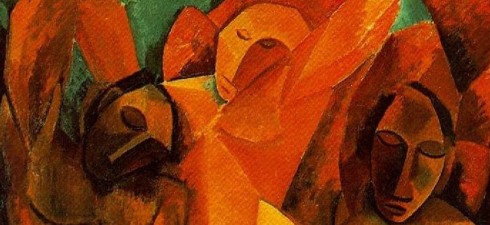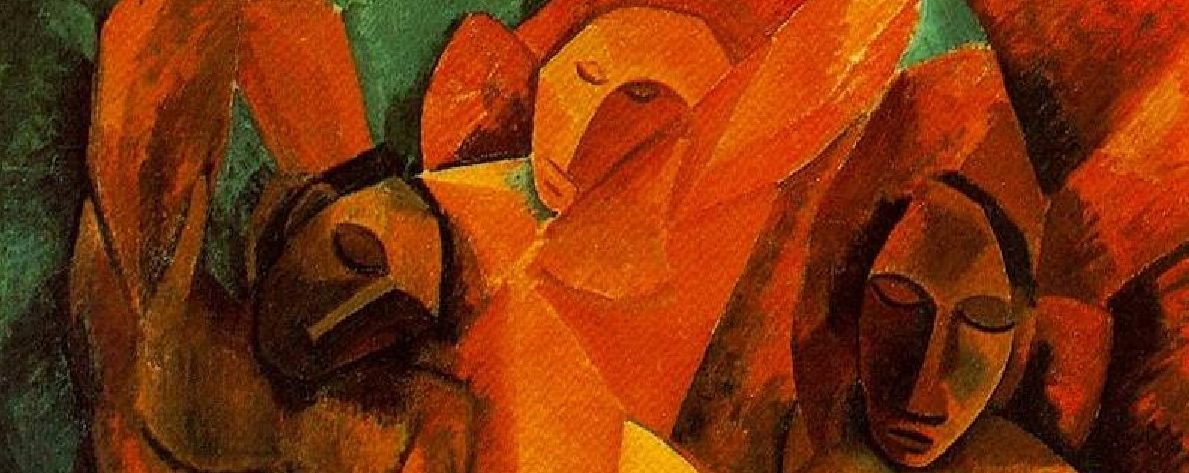Last’s week’s Cipher post drew a comment from a mind going by the name, Bitherwack. I’ve been kind of reveling the many facets in a way similar to how I experienced Picasso here in Seattle last night. Hope that’s not overly obsessive … or not. I’m an obsessive personality so I’ll own that and happily share this comment as the basis of a follow-on post to Mojibake. Bitherwack, please be my guest:
Mojibake is a good word to popularize. It fits the bill quite well.
If I were to add just one thing, I would mention that ‘化ã‘'(bake) has an even more interesting connotation than just ‘change’.
It is just like how we got ‘chemistry’ from the word ‘al-chem-y,’ the ‘chem’ part correlates with ‘bake.’
It is what transforms when the witch casts her spell. The ‘O-bake’ (honorific ‘bake’–the honor comes from fear of the inexplicable) is one of any number of ghosty gobliny beings; river sprites and trolls. (of which the newly sentient, freshly animated household object is often the scariest to the Japanese) Imagine flying umbrellas, or yards of fabric that wrap you in a cocoon of helplessness.
Pots and pans walk away, or turn into raccoons. A wallet thick with money will contain nothing but dried leaves in a wink, and you know you’ve been tricked by a foxy raccoon.
‘Bake’ isn’t just about changing, its about the charm that transforms everyday innocuous items into unrecognizable, uncooperative objects through unknown mischief. When we find ourselves stupefied by keys that should work, or items that have inexplicably disappeared, it has ‘bake-ru.’
There is the knowledge that through some incantation, some proper sequence, (reading the instruction manual!) the spell will be broken, and order will be returned.
The left half of 化 represents a person, the right half (if memory serves) is either a knife, or a sacrificial animal.
The idea is that when a person presents a sacrifice for the gods, it mystically transforms from a simple animal into the thing that will pacify the gods. From this idea of mystical transformation, comes the meaning for ‘bake.’ (Though inappropriate word use for a sacred setting, I can’t help but associate this with what is supposed to occur to the Host during a Catholic trans-substantiation.)
I’m inclined to add nothing, not wanting to color anyone’s reactions at this point and wanting to let the non-directional bass chords of “unknown mischief” resonate. But I will add this … I believe Picasso was totally tuned-in to the ‘bake’ that specters the shadows of every human mind.
— —


I’ll have to think more of this in terms of Picasso, but as for my own life, I recognize Bake-Ru as a familiar ‘frenemy.’ For example, just last night, my normally perfect rice went bizarrely wrong. If only I had the right incantation to set it right….
When things in life go bizarrely wrong, I think it’s human nature to obsess over what we did wrong… mentally (or even physically) retrace our steps to find where the misstep was. As if that will somehow ‘restore order’ or solve the problem. In almost all cases, it won’t. We just have to accept the new reality and move on.
Something has to explain Picasso! :D
Love this, Claire. Something tells me that rice is fortified with bake-ru. BTW, i’m a software tester so I spend all day retracing steps that led to some form of mojibake. Usually this process works well, but as you can tell if you’ve used software — it’s not working well enough.